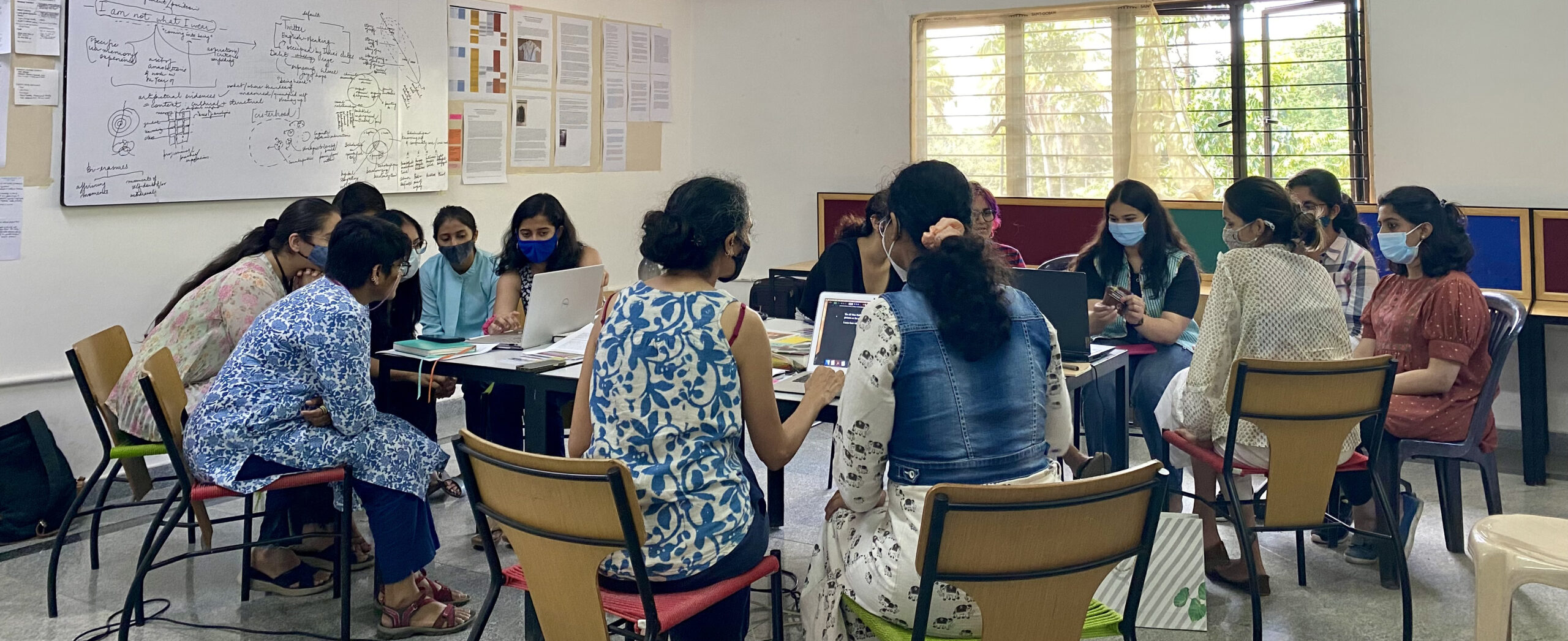
Srishti Manipal Institute of Art, Design, and Technology
Manipal Academy of Higher Education, Bengaluru
Since joining the Srishti Manipal Institute in 2021, I have led MA courses in the arts and humanities as well as mentored both graduate and undergraduate students in the context of a digital humanities research lab. My experience of teaching SMI’s five-week studio and lab intensives has been particularly unique in this set, given the self-defined need for such spaces to be simultaneously specific in their conceptual framings and generative for each student’s transdisciplinary inquiry. Together, these courses have involved the fields and methods of digital storytelling, critical making, queer-feminist digital media and archival studies, and anti-colonial digital humanities—and they remain open to students from MA, MDes, MFA, and MPlan concentrations, as well as individuals enrolled into the PGDP (Postgraduate Diploma) program. Click on each course title below to expand and read its corresponding abstract.
Feminist and Queer Worldbuilding, PhD Seminar, February-May 2024
We will begin this seminar with a selection of artifacts that invite us to consider what might constitute feminist and queer engagements with art, architecture, and design in history and theory. In doing so, we will orient ourselves to sites and embodiments of queer-feminism as resistance (Puar), refusals (Ahmed), and renewal (Muñoz) for collective worldmaking through time. We will hold these materials together and in conversation with each other to understand how the relationship between power and knowledge is imagined and mobilized for dignity, joy, and justice. The weekly sessions will interrelate cross-disciplinary texts, technologies, archives, and practices to further an intersectional analytic for naming and aligning with debates and desires viewed as peripheral—and even excessive—to everyday life. Framed and structured as a seminar to further reading, writing, and critical discourse building, this course will enable doctoral students to work individually and collaboratively through questions of gender, sexuality, as well as the body in connection to academic and creative scholarship, and toward making their attendant anti-patriarchal and anti-colonial worldmaking strategies both public and difficult to ignore.
The Future as Techno-Utopia, Community, and Technological Self, MA Seminar, January-April 2024
This course iteration of the Future of Human and Digital will engage scholarship on practices connected to Prototyping; Producing Speculative Fiction/Non-Fiction; Art Making; Archiving; Coding; Teaching and Learning; and Writing and Publishing. Each of these practices will cover a week and be read against three interrelated framings of the Future as Techno-Utopia; Community; and Technological Self. Individually and cumulatively, the reading assignments, I expect, will enable us—you and me—to conclude each week’s discussion with a deepened understanding of futures research at the intersection of technology, culture, and society. Reading materials will include texts, multimedia content, and creative projects—and together, we will ground an understanding of the human and digital relationship in such concerns as datafied subjects, privacy, climate emergency, information ethics, law, data sovereignty, liberatory worlds, and ethnic histories.
Gender and Technology, MA Seminar, August-October 2023
This course is an opportunity to come together to highlight and learn from the scholarly, creative, and community-centered contributions of women and gender minorities to the study and practice of technology-society interrelationships. Over the course of 10 weeks, and as a seminar, we will: 1_center projects and methods involving, but not limited to, queer and intersectional feminist digital humanities (DH); 2_cover critical technological discourses and practices led and laboured by women and gender minorities through time and towards justice-oriented goals; and 3_address structural challenges, gender discourses, and socio-technical critiques connected to each of these works—and specifically, examine how colonialism, casteism, racism, ableism, sexism, and cis-heteropatriarchy overlap as historical-contextual supremacies as well as how Indigenous, caste-oppressed, Black, disabled, women, queer, and trans scholars are showing us other ways of thinking with and relating to technology.
Care Matters and Justice Dreams, The Measure of All Things: Quantifying the Human, MA Studio I, II, III, September-October, 2021, 2022, 2023
The 2021 studio invited students to produce care work biographies of their interactions with technology during, but not exclusive to, the then raging COVID-19 pandemic. The studio assumed a hybrid form and resulted in 10 individual interactive stories with Twine. The 2022 studio furthered this care work focus by grounding itself more deeply into humanistic questions of biographical writing and storytelling, resulting in the production of individually written essays, interactive Twine narratives, and a collective studio book. Together, both of these iterations asked: How might you—and we—ensure that our current and future interactions with technologies and each other are rooted in and emerge from places and acts of care? What are the embodied, situated, and material forms of such care-based interactions? And how might your care work biographies inform technology-enabled descriptions, expectations, and measurements of self away from their positivist, disembodied, and surveilled notions?
For the 2023 iteration of Care Matters and Justice Dreams studio, we located ourselves in the overlaps between personal data, digital technologies, and the becoming of a human subject connected to workplace surveillance. Specifically, by engaging with gendered stories of technology involving wearable GPS trackers, CCTV cameras, biometric scanners, and even remote electronic monitoring softwares among others, we asked: What leads to the adoption and perpetuation of these systems in a given context? How might we name, contend with, and address socio-technical hegemonies and the power and politics embedded in their operations? Who can be authorial about labouring bodies and the labour itself in these workplaces? How is design implicated in such technological systems? And how might we center alternative and care-based responsibilities, accountabilities, principles, and counter-practices in design and across our workplaces?
Just Futures Co-lab Transdisciplinary Research (TDR) Program, Cycle 2, March-April 2021, 2022, 2023
The Just Futures Co-lab opens itself to pedagogy- and project-based discourses on technology-society interrelationships at the intersections of arts, humanities, and design. The lab brings together inquiries into intersectional feminist histories and futures with another on critical digital humanities pedagogy, and locates the integrated project spaces of Queer Futurities and Futures with the Peripheries in their overlaps. Since its inception in October 2021, the Just Futures Co-lab has fostered a transdisciplinary learning community on campus by integrating MA studios, theory seminars, and workshops into its intellectual life. Read more about the lab on SMI website or via its letters.
If Technology Will Not Save Us, What Will? The Future of Human and Digital, MA Seminar, January-April 2023
Over the course of two academic cycles, this seminar joined the rallying call of techwontsave.us to inquire into the integration of technology and politics along socially just and anti-oppression lines. In conversation with the vision, orientation, and approaches of the Just Futures Co-lab, and working against prevalent instrumentalist, corporate-capitalist, surveillance-centered, ableist, patriarchal, cis-heteronormative, and white and upper caste supremacists’ imaginations of digital technologies, this seminar invited students to engage with critiques, pedagogies, and projects of design and digital systems, platforms, and communities from distinct subject positions with urgency, heart, and precision.
Introduction to Digital Storytelling Committed to Anti-Colonialism, MAHE Summer School, 2022
This weeklong course introduced participants to anti-colonial digital humanities, focusing particularly on how to practice digital storytelling committed to anti-colonialism from a queer and feminist lens. We collectively read and annotated selected digital storytelling projects to address distinct colonial histories and legacies pervading the contemporary technoscape, and drew out the ethics and politics of engaging with digital tools for sustained accountability in community-centered storytelling work. Specifically, through a selection of interconnected digital media involving 1) digital images; 2) digital videos; and 3) digital games, as well as their corresponding tools and texts, we asked: How might we approach and consider the contested meanings of the term “digital storytelling”? How have communities responded to the growing pull towards digital storytelling across academic and non-academic contexts? What are the ethics of engaging with digital tools for sustained accountability in community-centered storytelling work?
Letters to Futures: Just Design Writing, The Future of Human and Digital, MA Seminar, January-April 2022
Over the course of two academic cycles, this seminar utilized the form and practice of writing letters both as case-studies in and a semester-long assignment on organizing for socially just futures of the human and digital. The seminar acknowledged that the study of the future of (non)human and digital is: 1) inextricably bound up with the interlocking systems of gender, race, caste, class, indigeneity, sexuality, and disability; 2) that such a study for the design of digital systems, platforms, and communities is deeply connected to land and land-based infrastructures; and 3) that together these interlocking connections nurture an imagination of the future as an ever intersectional, collectivist, and justice-oriented analytic for surviving in the present.
Decolonizing Design, MA Seminar, September-November 2021, 2022
If coloniality is about the violence and politics of power that determine what constitutes knowledge and with which cultures, peoples, spaces, and technologies do we come to know, to be, and to become in the world, then how might we write a description of the relationship between decolonization and design in terms of power, knowledge, being, and becoming? This graduate theory and understanding seminar invited students to engage texts and contexts for approaching decolonizing design, or for even considering its possibility with these questions. The course foregrounded the ethic of always remembering Eve Tuck and K. Wayne Yang’s writings on “Decolonization Is Not A Metaphor” (2012), that is, decolonization is neither a substitute for some other term nor a concept that can be used interchangeably with other movements.
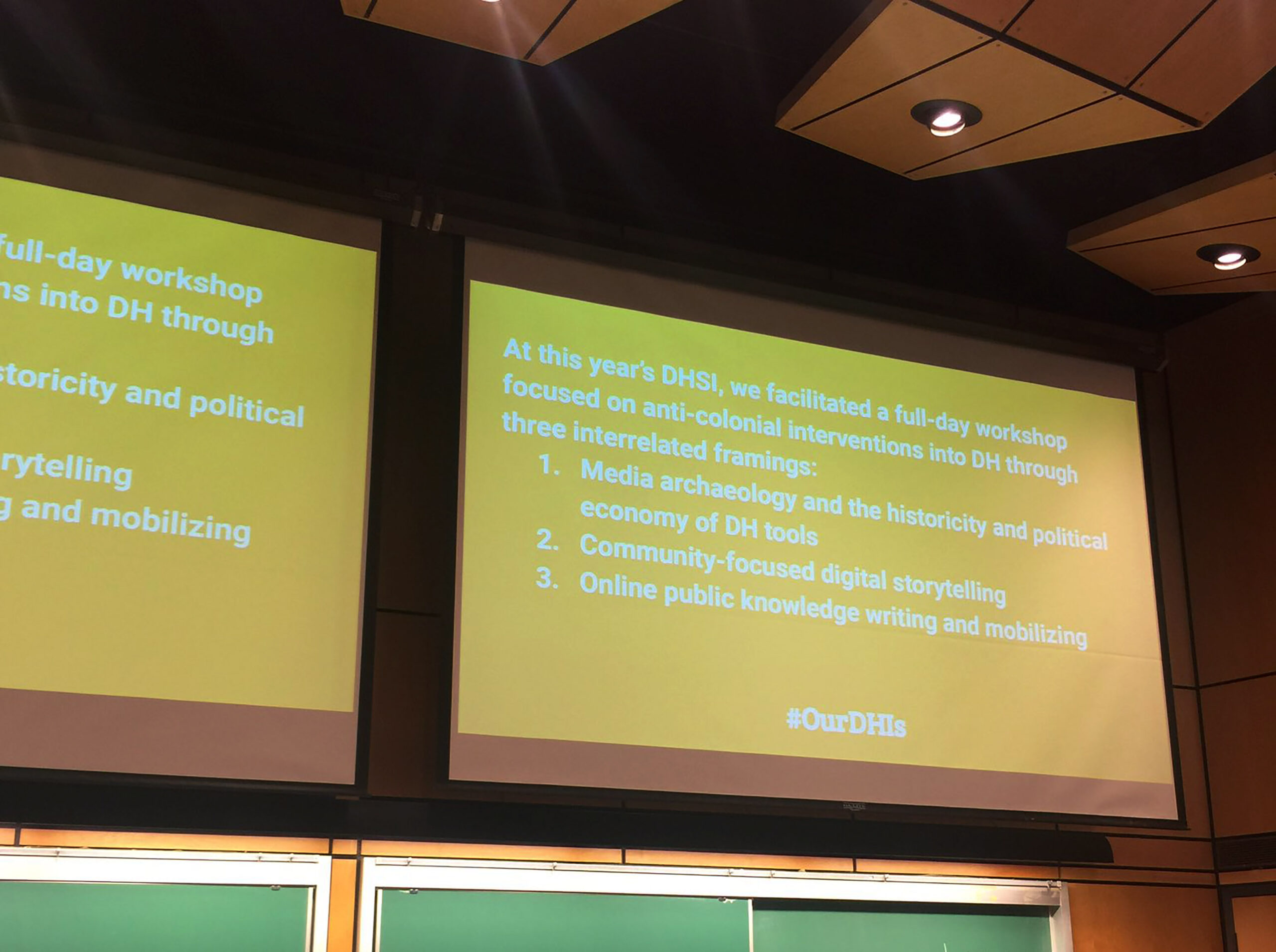
Anticolonial Digital Humanities
Pedagogy of the Digitally Oppressed Collective
We are a transnational anti-colonial digital humanities (DH) pedagogy practice, representing the fields of English, Indigenous, and Filipinx/a/o studies (Ashley Caranto Morford); Information Studies (Arun Jacob); and Architectural History-Theory and Design Studies (Kush Patel) respectively. We lead workshops, deliver talks, produce writings, and teach courses that focus on three framings: media archaeology; community-focused digital storytelling; and online public knowledge and writing. Paulo Freire’s writings on the “Pedagogy of the Oppressed” (1970) are foundational to the collective’s naming and structuring.
As we come together to learn in community, we also emphasize the ongoing erasures of and systemic oppressions towards Indigenous languages, cultures, knowledge systems, genders, and sexualities in the Global North and the Global South that make this responsibility of knowledge-making, deep listening, and strategic coalitional work particularly pressing for us. Our partnership remains committed to critical care and kinship, and to furthering a process of un-, re-, and co-learning in the context of critical DH pedagogy.
Recent teaching engagements include: The Digital Humanities Summer Institute Course, University of Victoria, BC (June 2023, 2022, 2021); Introduction to Anti-colonial DH as part of the Office of the Provost Faculty Development Program, Columbia College, Chicago (May 2022). To learn more about our pedagogy praxis, connect with us on Humanities Commons or visit our blog.
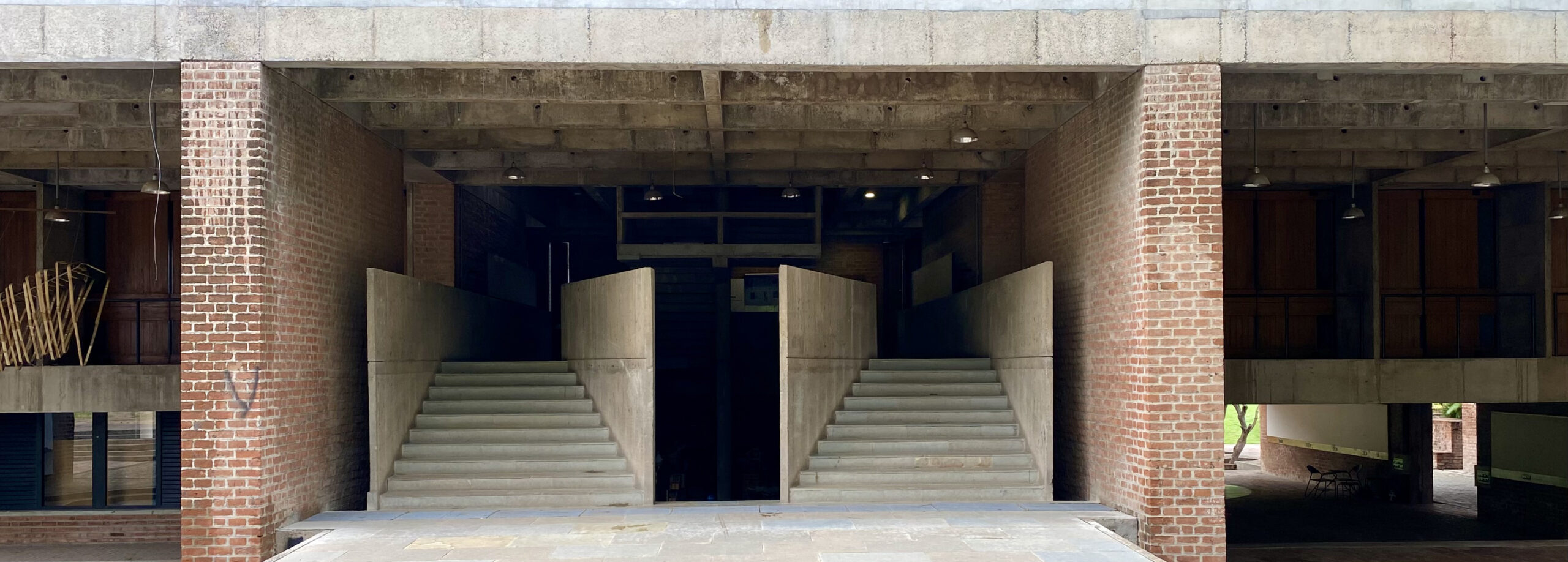
Faculty of Architecture
CEPT University, Ahmedabad
At CEPT, I first taught a graduate course in Urban Design as part of a teaching fellowship in Summer 2011 and subsequently an online graduate seminar in Architectural History and Research program in Monsoon 2021. Each of these courses met as a reading seminar, culminating respectively into an edited proceedings in print and a set of actionable grant proposals for further research into the history and theory of constructed environments. Click on each course title below to expand and read its corresponding abstract.
Materiality and Public Discourse, Master of Architectural History and Research, Monsoon 2021
In this reading and making seminar, students worked with selected artifacts to claim an understanding of materiality as an expression and a lived provocation, exhibiting alternative historiographies of the constructed environment. Specifically, by structuring the course around five thematic matters—making, caring, repairing, maintaining, and dismantling—we discussed the situated and studied approaches to modernist architectural history and their social and everyday significance.
Social Space / Spatial Practice, Urban Design Seminar, CEPT University, Summer 2011
In this reading seminar, students reviewed socio-political debates in 20th century architecture and urbanism alongside notions of expertise and ethics connected to Indian modernity to claim well-defined positions for their thesis projects. The course culminated with edited proceedings, “Social Space/Spatial Practice,” from CEPT University Press (2012).
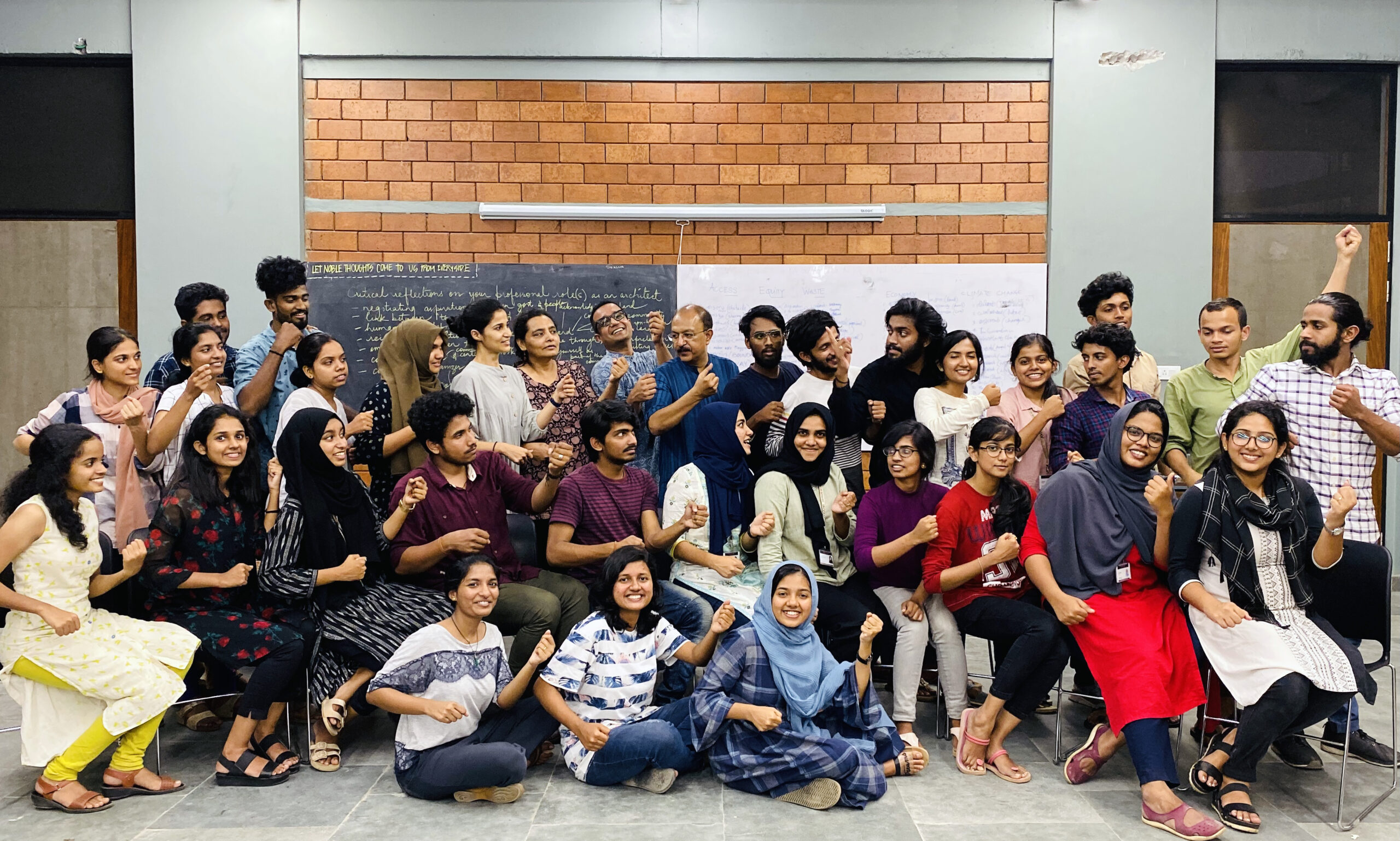
Avani Institute of Design
University of Calicut, Calicut
At Avani Institute of Design, I led undergraduate history and theory seminars in architecture; upper level electives each in urban design and on architectural research; and penultimate studios on city and people, which I collaboratively detailed in the framework of urban humanities. The 2019 and 2020 studios in particular constituted a field archive of coastal community infrastructures made fragile by technologies of dispossession, involving extensive community engagements in southern Kerala, including digital community engagements during the studio’s entirely remote and online pandemic phase. Click on each course title below to expand and read its corresponding abstract.
Cities with Whom? Supporting Infrastructures of Community Protection in Vizhinjam, Kerala, Semester IX Design Studio, Monsoon 2020
In year 02 (see the 2019 studio abstract below), students and I deepened our engagements with the overlapping infrastructures of equity, access, economy, waste, and climate change on land and in the sea; oriented ourselves explicitly around questions of community protection; and began with questions of the digital archive. The architectural resolutions during this completely remote and online semester covered critical spatial and infrastructural insights as well as neighborhood-level projects specific to community protection and even public health, bringing into discourse micro-infrastructures without whom there can be no city and with whom we can realize the possibility of a socially and an environmentally just city.
What Would You Like To Know Through Architecture? Semester IX Elective on Architectural Research, Monsoon 2020
This undergraduate elective provided students a theoretical and thematic foundation for the development of research topics and inquiries in architecture. Starting with unpacking the very definition of research in architecture through a range of epistemological positions, the course guided students to make claims about the relationship between design and research as relevant for studio-based projects, including design thesis, as well as for future pursuits in architecture academia and professional practice.
Thesis as Design Inquiry, Semester X Design Studio and Mentorship, Winter 2020
This course gave students the opportunity to produce an independent thesis in the field of architectural design under the guidance of a faculty advisor and within a supportive community of student peers and faculty mentors, which we called a design inquiry cluster. The three clusters that resulted from a review of students’ preliminary inquiries were: a) Politics of Architecture (focusing on inclusive, the invisible, the marginalised in society, spaces, discourses, and knowledge); b) Emergent Futures (focusing on shaping utopias through sustainable materialities and technologies); and c) Critical Urbanities (focusing on questions of urbanism, heritage, justice, and environmental traumas). Over the length of a semester, the course guided students to integrate both conceptual and practical dimensions of architectural design through a deep, systematic, and rigorous methodological inquiry that not only culminates into a design project, but also contributes to building discourse within its corresponding cluster. Mutually, the advisor-student pairing determined the feasibility of each thesis project not by the question of whether or not they are buildable, but rather by the possibilities that they open up in imagining and reimagining our past or present.
Modern India: Histories of Architecture and Urbanism, History of Architecture V, Winter 2020
This course surveyed the history of architecture and urbanism in relation to colonial and postcolonial theories of modern India, covering developments connected to the following three chronological and epistemological moments: 1) the origins and movement of British colonialism in India; 2) questions and formations of architecture and post-independence; and 3) contemporary pluralities.
Cities for Whom? Caring for Infrastructural Lives and Futures in Vizhinjam, Kerala, Semester IX Design Studio, Monsoon 2019
Situated within the communities of Madhipuram and Kottapuram in Vizhinjam, the year 01 studio made visible the otherwise palpable infrastructures of access, equity, waste, economy, and climate change involving the local fisherfolk’s lived realities. Vizhinjam is a port community near Trivandrum with a well-documented history of growth and displacement since the 1960s. Today, the livelihoods of these fisherfolks are under new uncertainties from the construction of another big project: The International Transshipment Terminal, currently being built near the villages towards the south. By the end of four months, the studio shared deep insights into how these infrastructures are shaped by the people in-situ and in relation to the port project. Students in groups also produced critical transects, oral transcripts, photo essays, individual poems, and a group song. During the final stage, students in pairs made a set of spatial drawings and a corresponding set of process and policy documents to depict how the design processes might differ from convention or how to sustain the proposals.
Shaping Urban Conditions and Futures: Questions of Space, Representation, Politics, and Publics in Urban Design, Semester IX Elective, Monsoon 2019
This elective surveyed the field of modern urban design from a range of perspectives and shifting paradigms to enable students to understand the contested meanings of the term “urban” in the context of professional expertise and everyday modernity. The course provided a basis for discussions about topics such as Space, Politics, Representation, and Publics to explore and complicate the relationships between design intention, social engagement, and project realization; architectural rhetoric, official stories, and community perspectives; material spaces, human activities, and lived overlays. Throughout the seminar, we grappled with the questions and challenges of shaping urban conditions in relation to both established and radical protocols of design. Our learning goal was raise the question of what is at stake and how might architects and urban designers contribute to, and collaborate in, building both socially and environmentally just futures.
Practices of Theory in and as Architectural Design, Semester III Seminar, Monsoon 2019
Focusing on a range of figures, movements, and propositions from over the course of twentieth and twenty-first centuries, this course provided an overview of critical theories in relation to the built environment that have variously informed, challenged, and constituted the limits and possibilities of contemporary architectural practice.

The Harlan Hatcher Graduate Library
University of Michigan, Ann Arbor
My librarianship practice at the University of Michigan constantly asked questions of how one might reclaim their bridge-building work on campus whilst shaping that work through connections with land, community, and kin. My librarianship practice participated in this collective movement to name care, accountability, and empowerment as bridging features of our collaborative work so that it can have shared visibilities and shared legacies. There is a growing roster of community-centered scholarly and digital pedagogy initiatives at the University of Michigan that are partnering with the efforts of organizers and activists in nurturing engaged citizenship through classroom learning. My work as Digital Pedagogy Librarian within U-M Library’s Connected Scholarship team was located in this realm of developing and supporting participatory initiatives with students, faculty, engaged learning centers, and off-campus community partners.
For a descriptive documentation of my librarianship pedagogy, read the post titled, “The Continuing Labor of Care” (December 26, 2018).
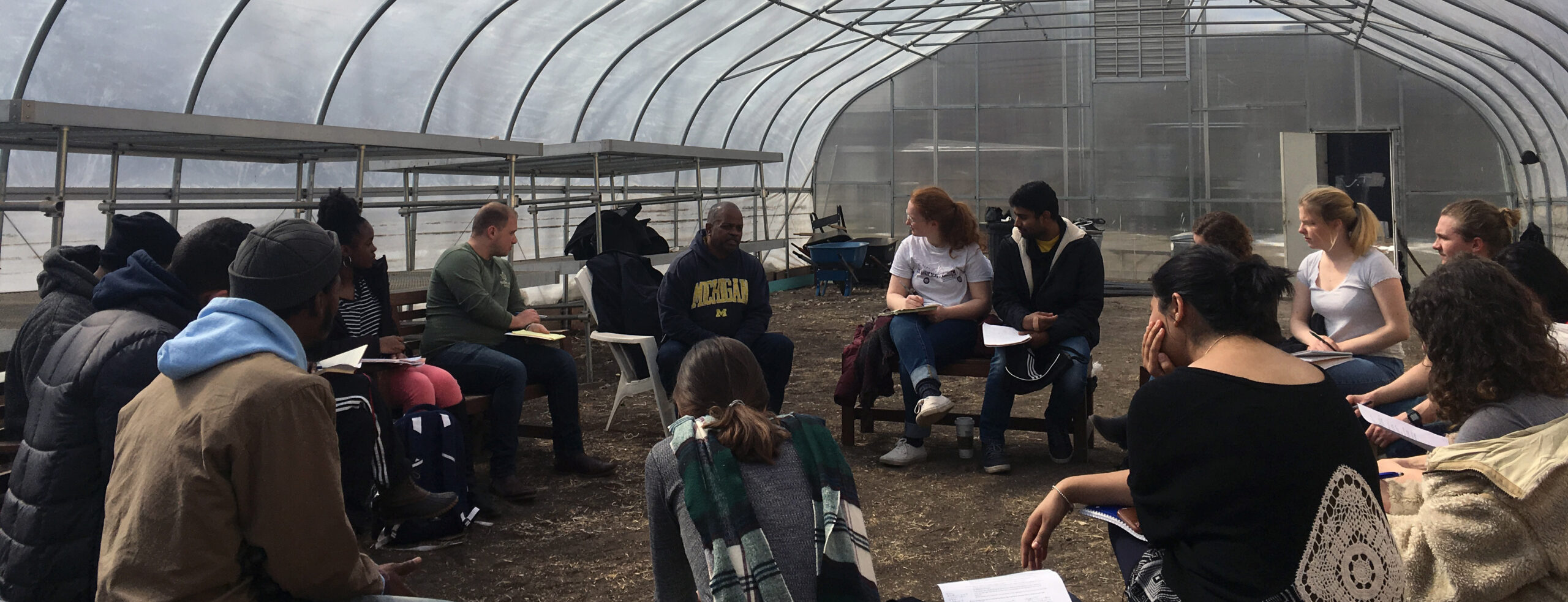
The College of Literature, Science, and the Arts
The Taubman College of Architecture and Urban Planning
University of Michigan, Ann Arbor
My teaching as Instructor of Record at the University of Michigan comprised undergraduate courses in interdisciplinary humanities through a two-year postdoctoral fellowship at the Institute for the Humanities, as well as a graduate seminar in art and architecture through a competitive teaching fellowship at the Taubman College of Architecture and Urban Planning. Together, these courses translate, I hope, the larger focus of my scholarship that is invested in fostering robust alliances for knowledge-sharing within the humanities and between the humanities and its diverse constituencies. Click on each course title below to expand and read its corresponding abstract.
The Plot Beneath the Garden, Interdisciplinary Humanities UG Seminar, Institute for the Humanities (Met with Program in the Environment, Women’s Studies, and American Culture), Winter 2018
In this course, students and I partnered with the Oakland Avenue Urban Farm in Detroit’s North End to study their participatory practices of land stewardship, food production, and community development. Specifically, we engaged with our partners’ stories—distinct in race, class, and gender—and placed them in conversation with relevant theoretical and historical perspectives on space, politics, and justice. As we explored these accounts, we discussed how our partners are imagining the city for themselves and their communities, and the extent to which they are building an infrastructure to support those visions through agriculture, art, and architecture. At its core, the course served as a space of reflection for students and an opportunity for us to collaboratively and critically inform the Smithsonian’s “Community of Gardens” digital public archive.
Experiments in Cultural Citizenship + Seeking Collaboration, Building Community: Tracing the Development of Arts of Citizenship (1998-2016), Interdisciplinary Humanities UG Mini-Seminar, Institute for the Humanities, Winter 2017 + Fall 2017
In each of these courses, we considered the question of cultural citizenship as advanced by the critical, creative, and collaborative work of Arts of Citizenship, an interdisciplinary public scholarship program at the University of Michigan. Teaching and learning with the program’s archive at the Bentley Historical Library, we engaged key projects and figures from the 1990s to the present who have integrated community engagement into the humanities and arts, as well as collaborative education at the undergraduate and graduate levels with this program. Our goal was to examine how the practice of community-engaged learning in the humanities has evolved on campus and transformed both university and public life along democratic lines. The classes met in a seminar format to discuss assigned readings, report on findings from the archive, reflect on the larger themes of public scholarship and community engaged work, and discuss the progress of group projects.
Taking Humanities to the Streets, Interdisciplinary Humanities UG Mini-Seminar, Institute for the Humanities, Fall 2017
In this course, we explored key experiences of public humanities work (from pedagogy and community engagement to education policy and political action) to understand its role in describing and envisioning what it means to practice citizenship today. We focused on a set of U-M based initiatives and another based outside of Michigan, and worked through these issues in a comparative light to trace how citizenship is enacted within and across geographical difference. We were also joined by guest speakers who are shaping the practice of citizenship through interrelated scholarly, pedagogical and/or activist formations. Each guest speaker or public scholar talked about their approach to the public humanities and specific contributions to a given project. They also elaborated on how we might assess publicly engaged works and make claims for the value of scholarship and pedagogy in transforming our institutions and communities.
Agency, Agenda, and Social Space, Graduate Seminar, The Taubman College of Architecture and Urban Planning, Fall 2012
Following Henri Lefebvre’s theory of production of space, many scholars have come to view space as a distinct social and political category, actively produced at the intersection of mental, material, and experiential phenomena. The ensuing argument that space has political meaning and that it should be conceived of as a social product has provided a valuable framework for architectural theorists and environmental design researchers interested in examining questions of human agency and social agenda in architecture. At the same time, however, the conception of everyday nature of power in practices of space without the agency of any specific community has become popular. How might we study the narrative about social space within architecture, whilst also investigating the meaning of agency towards greater clarity? How might we examine material responses to questions of social space involving divergent expectations? Is it possible to reconcile spatial strategies that raise social questions and those that work with them through direct action? This course investigated notions of space, agency, and practice and their interrelationships from a range of theoretical perspectives and design juxtapositions. We worked through the writings of late 20th century social theorists who discuss the relationship between space and society in terms of agency and
materiality of everyday life. We contrasted writings and design practices that battle issues of social inclusivity and autonomy with those that encourage critical explorations of space through participation. The syllabus also included texts on urban practices that focus on space and subjectivities such as women and loitering, youth and skateboarding to help connect specific renderings to a wider context of social theory and spatial scholarship.
My experiences of Graduate Student Instructorship at the Taubman College include: a) History of Architecture II, Teaching Assistant for Stephanie Pilat, Winter 2010 (second in the undergraduate two-course sequence, this offering surveyed the history of architecture from the 16th century to the present, asking students to focus on the interactions between architecture and its cultural, economic, political, and social contexts from around the world); b) Design Fundamentals I, Teaching Assistant for Gretchen Wilkins and Neal Robinson, Fall 2007 (in this undergraduate course, students gained base knowledge of fundamentals in architectural design by combining aspects of architectural history and theory, construction technology, and spatial analysis. In addition to leading two discussion sections of 20 students each, co-teaching (with other GSI’s) course projects, grading student papers, reviewing workshop outcomes in pin-ups and roundtable meetings, I enlarged the repertoire of course teaching materials by putting together a hand-out on critical reading and writing skills for use by course instructors across sections); and c) Seeing the City: Swiss Travel Studio (Ann Arbor component), Teaching Assistant for Julie Larsen and Roger Hubli, Spring 2007 (in this studio, students developed strategies from “seeing” the everyday life of cities and produced an atlas of drawings that interpreted networks, borders, and differences through being in the city).